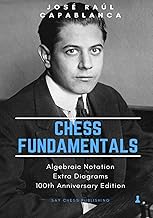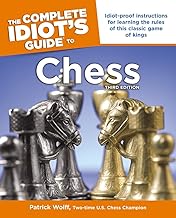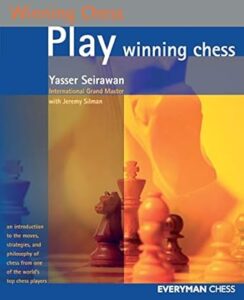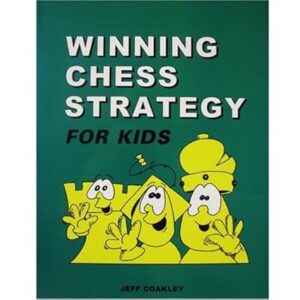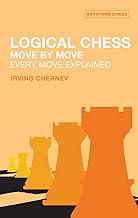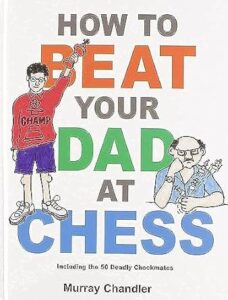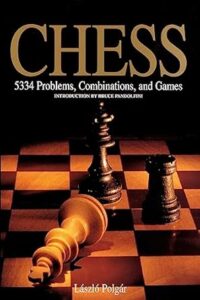The Top 10 Chess Books for Beginners: Your Guide to Starting Strong
Chess is more than just a game—it’s an art, a science, and a test of mental endurance. For beginners, learning chess can be both exciting and overwhelming. With so many strategies, rules, and tactics to understand, it’s essential to start with the right resources. In this guide, we’ll take you through the top 10 chess books for beginners, breaking down what makes each one invaluable. These books don’t just teach the rules—they help you think like a chess player.
Whether you’re looking to master the basics or prepare for competitive games, the right book can act as your personal mentor. Pair these books with online training platforms for a comprehensive learning experience.
1. Bobby Fischer Teaches Chess
- Price: $8.99 (Paperback)
- Overview: Written by one of the greatest chess players in history, this book is a gem for beginners who want to learn the game from a master. Bobby Fischer, known for his unparalleled genius on the chessboard, breaks down complex concepts into digestible lessons.
- What Makes It Special: The book is structured like a series of interactive puzzles. You’re not just reading about chess—you’re actively solving problems and learning as you go. This “programmed instruction” format is rare in chess literature and particularly effective for self-study.
- Key Takeaways:
- Learn to recognize checkmating patterns.
- Develop the ability to think a few moves ahead.
- Master the basic endgame strategies.
- Why Beginners Love It: Fischer’s no-nonsense approach makes this book a practical and enjoyable introduction to chess. It teaches you to think critically about every move, a skill that sets the foundation for advanced play.
2. Chess Fundamentals by José Raúl Capablanca
- Price: $7.99 (Paperback)
- Overview: José Raúl Capablanca, the third World Chess Champion, is often praised for his natural understanding of the game. In this book, he shares the principles that helped him become a legend.
- What Makes It Special: Unlike many books that focus on tactics, Capablanca emphasizes positional play and strategy. This is particularly important for beginners, as it helps you understand why certain moves are made.
- Key Takeaways:
- Understand the value of controlling the center of the board.
- Learn the importance of developing pieces early in the game.
- Master endgame basics, including pawn promotion and king activity.
- Why Beginners Love It: Capablanca’s writing is clear and concise. He doesn’t overwhelm readers with jargon, making it easy to grasp concepts even if you’re completely new to chess.
3. The Complete Idiot’s Guide to Chess by Patrick Wolff
- Price: $14.99 (Paperback)
- Overview: Don’t let the title fool you—this book is a goldmine for beginners. Patrick Wolff, a two-time U.S. Chess Champion, uses humor and straightforward explanations to make chess accessible.
- What Makes It Special: This book covers a wide range of topics, from the absolute basics to intermediate strategies. It’s perfect for someone who wants a single resource to guide them through their first games.
- Key Takeaways:
- Learn opening principles that set you up for success.
- Discover common beginner mistakes and how to avoid them.
- Understand the psychology behind decision-making in chess.
- Why Beginners Love It: Wolff’s approachable tone and clear explanations make chess feel less intimidating. The diagrams and examples help reinforce the lessons, ensuring you’ll retain what you learn.
4. Play Winning Chess by Yasser Seirawan
- Price: $12.99 (Paperback)
- Overview: Yasser Seirawan, a grandmaster and acclaimed chess commentator, offers a thoughtful approach to learning the game. This book focuses on strategy rather than rote memorization of moves.
- What Makes It Special: Seirawan introduces concepts like pawn structure, piece coordination, and planning, helping beginners see the bigger picture.
- Key Takeaways:
- Understand the importance of time, space, and material.
- Learn how to create and execute a plan.
- Develop a strategic mindset that goes beyond tactics.
- Why Beginners Love It: Seirawan’s passion for the game shines through in every chapter. His writing is engaging, making complex ideas feel approachable.
5. Chess for Kids by Michael Basman
- Price: $9.99 (Paperback)
- Overview: This colorful and engaging book is designed for young learners but works equally well for adults who prefer a lighthearted approach.
- What Makes It Special: Basman uses vibrant illustrations and simple language to explain chess fundamentals. The book is filled with fun exercises that reinforce learning.
- Key Takeaways:
- Master the basic rules and piece movements.
- Learn simple tactics like forks and pins.
- Build confidence through playful exercises.
- Why Beginners Love It: The visuals and straightforward explanations make it a joy to read. It’s an excellent choice for anyone who wants to learn chess in a stress-free way.
6. Winning Chess Strategies for Kids by Jeff Coakley
- Price: $19.99 (Paperback)
- Overview: Jeff Coakley’s book is a treasure trove of puzzles, exercises, and games designed to teach strategic thinking.
- What Makes It Special: The book combines theory with practical exercises, ensuring that readers can immediately apply what they’ve learned.
- Key Takeaways:
- Understand the importance of active pieces.
- Learn how to identify threats and opportunities.
- Develop problem-solving skills through puzzles.
- Why Beginners Love It: The interactive format keeps readers engaged, making it an ideal resource for anyone who learns best by doing.
7. Logical Chess: Move by Move by Irving Chernev
- Price: $16.99 (Paperback)
- Overview: This classic book analyzes 33 games, explaining every move in detail. Chernev’s step-by-step commentary makes it an invaluable resource for beginners.
- What Makes It Special: By focusing on entire games, the book teaches beginners how to think holistically about chess.
- Key Takeaways:
- Learn the logic behind opening moves.
- Understand how to transition from the opening to the middle game.
- Gain insight into endgame strategies.
- Why Beginners Love It: Chernev’s explanations are clear and insightful. Readers often feel like they’re learning from a personal coach.
8. The Steps Method by Rob Brunia and Cor van Wijgerden
- Price: $29.99 (Workbook and Guide)
- Overview: The Steps Method is a structured curriculum that breaks chess learning into manageable stages. It’s widely used in schools and chess clubs.
- What Makes It Special: Each step focuses on specific skills, building a strong foundation before moving on to more advanced topics.
- Key Takeaways:
- Develop tactical skills through targeted exercises.
- Learn to evaluate positions and make strategic decisions.
- Progress at your own pace with the step-by-step format.
- Why Beginners Love It: The methodical approach ensures that learners don’t feel overwhelmed. The workbooks make it easy to track progress.
9. How to Beat Your Dad at Chess by Murray Chandler
- Price: $13.99 (Paperback)
- Overview: This fun and practical book focuses on essential checkmating patterns, helping beginners win games quickly.
- What Makes It Special: The humor and engaging style make learning enjoyable. Chandler simplifies complex ideas, making them easy to grasp.
- Key Takeaways:
- Learn 50 must-know checkmating patterns.
- Build confidence by mastering simple tactics.
- Develop the ability to spot winning moves.
- Why Beginners Love It: The playful tone makes it a favorite among younger readers, but adults appreciate its practical advice too.
10. Chess: 5334 Problems, Combinations, and Games by Laszlo Polgar
- Price: $24.99 (Paperback)
- Overview: This massive collection of puzzles is perfect for sharpening your tactical skills. It’s a long-term resource that can grow with you as you improve.
- What Makes It Special: The sheer variety of problems ensures that there’s something for everyone, from beginners to advanced players.
- Key Takeaways:
- Develop pattern recognition skills.
- Improve your ability to calculate variations.
- Build confidence through consistent practice.
- Why Beginners Love It: The book offers endless opportunities for practice, making it an excellent companion for daily training.
Where to Learn Chess Online as a Beginner
Learning chess doesn’t have to stop with books. Online platforms offer interactive lessons, real-time play, and tools to track your progress. These platforms allow beginners to learn at their own pace while engaging with a global community of players. Below are two of the most popular options for beginner chess training:
1. Chess.com: The World’s Leading Chess Platform
- Overview: Chess.com is arguably the most popular online chess platform, boasting millions of users worldwide. It’s beginner-friendly, with an extensive library of lessons, videos, and puzzles tailored to all skill levels. The intuitive interface ensures that even those new to the game can navigate with ease.
- Key Features:
- Lessons and Tutorials: Hundreds of video tutorials and interactive lessons designed by chess masters. Topics range from the rules of chess to advanced strategies.
- Puzzles: Over 100,000 puzzles that help sharpen tactical skills. These puzzles are categorized by difficulty, so beginners can gradually work their way up.
- Live Play: Play games against other beginners or choose computer opponents with adjustable difficulty levels.
- Analysis Tools: Review your games with powerful analysis tools that show where you excelled and what mistakes to avoid in the future.
- Tournaments and Events: Beginners can participate in friendly tournaments to test their skills in a low-pressure environment.
- Pricing:
- Free tier with access to basic lessons, puzzles, and live games.
- Premium plans start at $5/month, unlocking advanced features such as unlimited puzzles, masterclass lessons, and deeper game analysis.
- Why It’s Great for Beginners: Chess.com combines education and entertainment. Its tools and resources are designed to make the learning process both effective and fun. The community aspect also provides a sense of belonging, motivating players to improve.
2. Lichess.org: A Free, Open-Source Platform
- Overview: Lichess.org is a completely free chess platform built by the chess community for the chess community. It’s ideal for those looking for high-quality resources without the commitment of a paid subscription.
- Key Features:
- Interactive Lessons: The “Learn” section is specifically designed for beginners, covering the rules, piece movements, and fundamental strategies.
- Practice Puzzles: Thousands of puzzles, including tactical exercises and endgame challenges, help players improve incrementally.
- Game Modes: Play against other users, join tournaments, or practice against an AI opponent with varying difficulty levels.
- Game Analysis: After every game, players can review their performance using Stockfish, one of the most powerful chess engines.
- Variants and Challenges: For those looking to have fun, Lichess offers unique chess variants such as Chess960 and Crazyhouse.
- Pricing: 100% free. Lichess operates without ads and is funded entirely by donations from its users.
- Why It’s Great for Beginners: Lichess’s open-source nature and ad-free environment make it a favorite among players who prefer a clean, distraction-free learning experience. It’s particularly great for self-motivated learners who want access to high-quality resources without spending a dime.
Which Platform Should You Choose?
Both Chess.com and Lichess.org have their strengths. If you’re looking for a platform with structured lessons, tournaments, and an active community, Chess.com is the way to go. On the other hand, if you prefer a completely free resource with excellent tools for self-study, Lichess.org is unmatched. Many players use both platforms to maximize their learning.
Conclusion: Start Your Chess Journey Today
Chess is a game of endless possibilities, offering rewards that extend far beyond the board. Whether you’re seeking mental stimulation, improved problem-solving skills, or simply a fun and challenging hobby, learning chess is an investment in yourself.
This guide has introduced you to ten of the best chess books for beginners, each designed to help you grasp the fundamentals and build confidence. These books offer step-by-step guidance, practical exercises, and invaluable insights into the art of chess. Pairing these resources with online platforms like Chess.com and Lichess.org ensures a comprehensive learning experience.
What’s Next?
- Start with a book that resonates with your learning style. If you’re a visual learner, consider “Chess for Kids” or “How to Beat Your Dad at Chess.” If you prefer methodical explanations, “Logical Chess: Move by Move” is an excellent choice.
- Supplement your reading with online practice. Use Chess.com or Lichess.org to play games, solve puzzles, and track your progress.
- Set achievable goals. For example, aim to learn a new checkmate pattern each week or play five games daily against players of your skill level.
- Remember, chess improvement takes time and patience. Celebrate small victories, and don’t be discouraged by losses—they’re opportunities to learn.
No matter your age or background, chess has something to offer. With dedication and the right resources, you’ll not only become a stronger player but also develop a deeper appreciation for the beauty and complexity of the game. So grab a book, sign up for an online platform, and make your first move toward chess mastery today!


